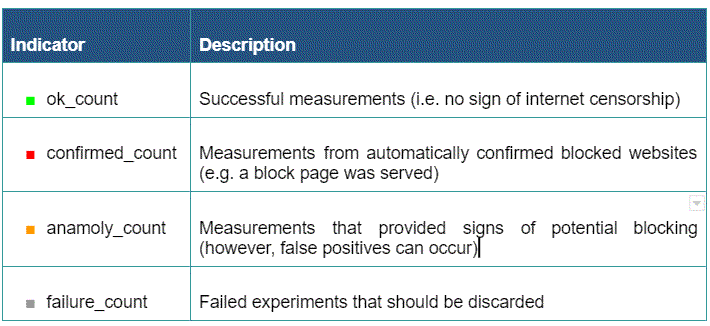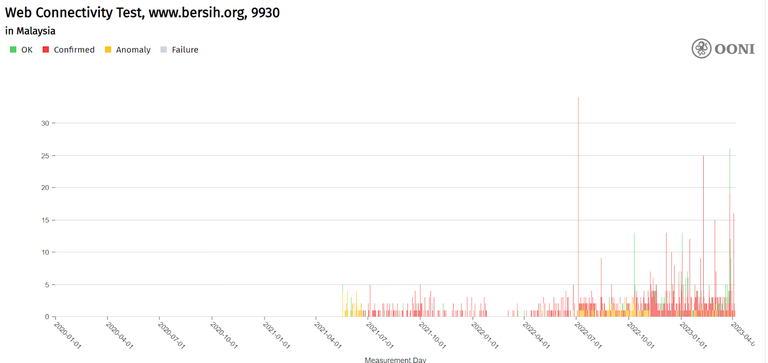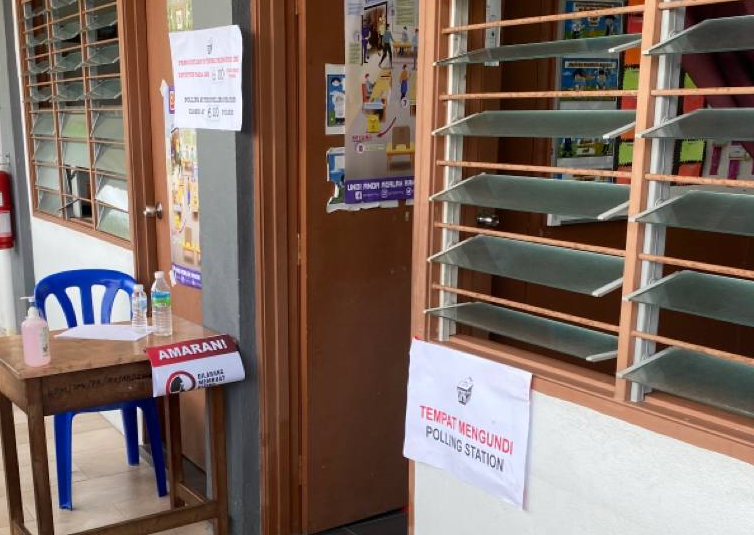15th Malaysian General Elections: Internet Censorship Monitoring
Key Findings
- A total of 68 websites were in the test list, comprising a few categories: News & Media, Politicians and Political Parties, Social Media, Election Monitoring and Official Election Commission websites.
- No significant censorship was found, with the exception of the blocking of Bersih.org by TT DOTCOM. This is the official website belonging to the Coalition for Clean and Fair Election but this has already been blocked since 2021 based on OONI’s data.
- There were above-average failures and anomalies reported in accessing the MySPR Semak website (https://mysprsemak.spr.gov.my/semakan), which was to check information on polling; as well as InfoPRU, a website of the coalition Perikatan Nasional (https://www.pnbest.my/).
Background
Following online censorship that occurred during the 14th Malaysian General Elections in 2018, there was a likelihood that websites publishing contents related to elections, particularly those belonging to news media, could be censored during the period leading to the polling day and the period after, especially if there is a change of administration.
In line with the upcoming elections in a few countries in Southeast Asia, this report outlines the methodology, findings, as well as conclusions and recommendations based on the monitoring.
Methodology
The monitoring was conducted using Open Observatory Network Interference (OONI), a tool to measure internet censorship using a mobile or desktop app. Specifically, it measures blocking of websites, instant messaging apps and circumvention tools using the OONI Probe app, where the data is then captured into OONI Explorer to be analyzed via open data.
Prior to the 15th Malaysian General Elections which was held on 19 November 2022, a closed workshop was held with Sinar’s partners to teach on how to use the OONI Probe, as well as to get ideas on what websites to be included in the test list.
The elections test list is divided into a few categories: News & Media, Politicians and Political Parties, Social Media, Election Monitoring and Official Election Commission websites.
This test list was shared among the partners, and they were given time of about 2 weeks until Election Day to finalize. On Election Day, a few new websites started to appear, including Election Monitoring websites initiated by media organizations.
This test list was then added onto OONI Run, where custom links are sent to partners and posted on Sinar’s website and social media to be run on Election Day. At the same time, Sinar ran automated testing of the entire test lists, covering 2 ASNs. The tests continued to run for a few days after elections for monitoring purposes.
Findings
There was a total of 68 websites in the finalized test list:
|
Categories |
No. of websites |
|
Election monitoring |
13 |
|
News and media |
23 |
|
Official Election Commission websites |
4 |
|
Politicians and political parties |
23 |
|
Social media |
5 |
|
Grand Total |
68 |
Table: Number of websites in the GE15 monitoring test list by category
From 19 November to 21 November 2022, there were a total of 1,642 measurements recorded on these websites in Malaysia:
|
Category |
ok_count |
anomaly_count |
confirmed_count |
failure_count |
|
Election monitoring |
213 |
1 |
5 |
1 |
|
News and media |
358 |
0 |
0 |
0 |
|
Official Election Commission websites |
74 |
8 |
0 |
18 |
|
Politicians and political parties |
583 |
10 |
0 |
23 |
|
Social media |
347 |
1 |
0 |
0 |
|
Grand Total |
1575 |
20 |
5 |
42 |
Table: OONI measurements of the websites by result type

Table: Indicators of OONI measurements
On a more detailed level, the only website found blocked was the Bersih website, which was already found to be blocked before the elections by TT DOTCOM SDN BHD (AS9930). This has been confirmed blocked on OONI since 2021:

Chart: Blocking www.bersih.org on ASN9930 since 2021
There was also a significant number of failures recorded on the Official Election Commission website (https://mysprsemak.spr.gov.my/semakan), which was to be used to check polling information. This was also in line with complaints made by the public as reported by The Star. Consequently, there was another website https://semak.info/ allegedly becoming the alternative, although it is unknown who managed this website together with the electoral database it contained.
In the Politicians and political parties category, there were also a number of anomalies and failures of nine websites belonging to various politicians/political parties. Only InfoPRU, a website of the coalition Perikatan Nasional (https://www.pnbest.my/) recorded an above-average number of 15 failures and 6 anomalies, whereas the rest recorded a minimal count. Minimal anomalies and failures were also found in the other categories.
|
URL |
Category |
No. of anomalies |
No. of failures |
|---|---|---|---|
|
Politicians and political parties |
0 |
1 |
|
|
Politicians and political parties |
0 |
1 |
|
|
Politicians and political parties |
0 |
1 |
|
|
Politicians and political parties |
1 |
0 |
|
|
Politicians and political parties |
0 |
3 |
|
|
Politicians and political parties |
2 |
1 |
|
|
Politicians and political parties |
1 |
0 |
|
|
Politicians and political parties |
1 |
0 |
|
|
Politicians and political parties |
1 |
0 |
|
|
Politicians and political parties |
1 |
0 |
|
|
Politicians and political parties |
1 |
0 |
|
|
Politicians and political parties |
1 |
1 |
|
|
Politicians and political parties |
1 |
15 |
|
|
Social media |
1 |
0 |
|
|
Official Election Commission websites |
1 |
1 |
|
|
Official Election Commission websites |
1 |
2 |
|
|
Official Election Commission websites |
6 |
15 |
|
|
Election monitoring |
1 |
0 |
|
|
Election monitoring |
0 |
1 |
Table: Websites where at least one anomaly or one failure was found during the monitoring period
Conclusions and recommendations
No significant blocking of websites was found during the elections. This showed an improvement of access to information, as compared to the previous elections where live.undi.info, an independent media elections results website run by independent news site MalaysiaKini was blocked for a few hours during key election results announcement period on TMnet and Maxis networks.
Although the call for testing was done through Sinar’s website and social media, the fastest method to collect the measurements was through automated testing, as well as through links provided using instant messaging to partners. The usage of OONI Run is especially helpful in providing direct links to partners to immediately test, although they will need to have the app installed in their devices.
To contribute to the project
Monitoring online censorship is crucial especially in a political event like elections. Here is how you can contribute to further improve OONI’s measurements and results:
- Testing: You may test on various platforms, both on Mobile (iOS and Android) and Desktop, including on the CLI on Linux platforms. There is also the newly introduced OONI Probe Web, where you can test on your browser. The domains you test can be either randomly selected from the Citizenlab Test Lists or custom test lists specific to your needs using OONI Run.
- Contribute to the test lists: You can contribute to the test lists on GitHub or on OONI.
- Translate the OONI Probe to your local language here.
- Participate in community discussions on the OONI’s Slack channel.
About iMAP
Internet Monitoring Action Project (iMAP) aims to establish regional and in-country networks that monitor network interference and restrictions to the freedom of expression online in 9 countries: Myanmar, Cambodia, Hong Kong, India, Indonesia, Malaysia, Philippines, Thailand, and Vietnam. Sinar Project is currently working with national digital rights partners in these 9 countries. The project is done via Open Observatory Network Interference (OONI) detection and reporting systems, involving the maintenance of test lists and measurements.
More information available at: imap.sinarproject.org. Any enquiries and suggestions about this report can be directed to [email protected].

